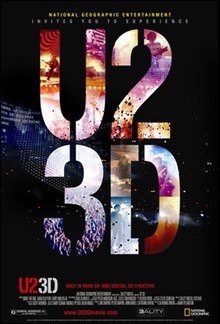U2 3D
| U2 3D | |
|---|---|
 |
|
| Directed by |
|
| Produced by |
|
| Starring | |
| Music by | U2 |
| Cinematography |
|
| Edited by | Olivier Wicki |
|
Production
company |
|
| Distributed by | National Geographic Entertainment |
|
Release date
|
|
|
Running time
|
85 minutes |
| Country | United States |
| Language | English |
| Budget | $15 million |
| Box office | $26.2 million |
U2 3D is a 2007 American-produced 3D concert film featuring rock band U2 performing during the Vertigo Tour in 2006. The film contains performances of 14 songs, including tracks from How to Dismantle an Atomic Bomb (2004), the album supported by the tour. The concert footage includes political and social statements made during the shows. It is the band's second feature film, following their 1988 rockumentary Rattle and Hum. Among several cinematic firsts, U2 3D was the first live-action digital 3D film.
The project was created to experiment with a new type of 3D film technology pioneered by producer Steve Schklair. After considering shooting American football games in 3D, Schklair's company 3ality Digital decided to create a concert film with U2. The band were hesitant to participate, but agreed to the project mainly as a technological experiment rather than a profit-making venture. Although set in Buenos Aires, U2 3D was shot at seven concerts across Latin America, and two in Australia. The film's complex setup involved shooting with up to 18 3D cameras simultaneously and capturing the footage digitally.
After a premiering out of competition at the 2007 Cannes Film Festival, U2 3D showed at the 2008 Sundance Film Festival and had its limited theatrical release in late January 2008, followed by its wide release the following month. The film was distributed by National Geographic Entertainment and was only released in IMAX 3D and digital 3D theaters. It peaked at number 19 at the United States box office, and earned over $26 million worldwide, ranking as one of the highest-grossing concert films. It received widely positive reviews, with critics praising the 3D technology and innovation. U2 3D won several awards, and its reception convinced some of the creators that the project marked a paradigm shift in filmmaking.
...
Wikipedia
